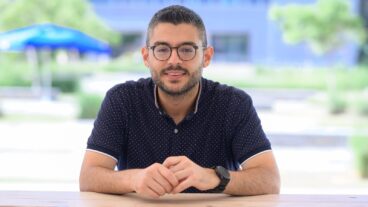Professor Abdullah Haj-Yehia: My main objective is to be a good scientist.When Abdullah Haj-Yehia was a boy living in the Israeli-Arab village of Taibe, his dream was to become a professor at an Israeli university.
It seemed an unlikely dream for the son of a laborer who worked in the fields of a nearby kibbutz and had eight children to feed and clothe.
But it was not an impossible dream. Today Haj-Yehia, 46, is an exemplary case of an Israeli Arab who has succeeded. Not only was he the first Arab to attain the rank of full professor at Hebrew University, he is a scientist of international stature, has co-founded a US company, works as a physician treating Jewish and Arab patients, and lives in Neve Shalom, a unique Israeli village where Arabs and Jews live together peacefully in co-existence.
Last month, Hebrew University awarded him the Kaye Innovation Award in recognition for his work in developing new drugs that hold out the promise of treating vascular disorders without the toxic side effects of existing medications. The Kaye Award is the most prestigious of those given for innovative work by staff and students at the Hebrew University, and is presented annually at the Board of Governors meeting.
Haj-Yehia is a most unusual man. Small and sprightly, he comes across as an affable and genial person who is ready to please. This geniality, however, hides a vein of pure stubbornness and grit, that have allowed him to flourish even in the most impossible of circumstances.
Haj-Yehia spent his childhood years in Taibe, a small village close to Kfar Sava. He was educated there and after finishing school applied to Hebrew University to study either law, pharmacy or medicine. In the interim he and some friends made their way to the Red Sea and began working there as laborers. The money was good and for awhile Haj-Yehia admits that he considered dropping out of the educational system.
When he was called for a psychometric exam, however, his boss, a Jew from Petah Tikvah, persuaded him to give it a go and drove him all the way from Eilat to take the exam in Jerusalem. He passed and was offered places at all three departments. Initially Haj-Yehia tried law, but opted out after a few weeks and took up pharmacy instead. His first term was extremely difficult since Haj-Yehia had only studied humanities in the past, but he committed himself to the course and was soon receiving top marks, earning himself a scholarship through university.
At the end of his degree course, Haj-Yehia took a masters degree in bio-chemistry, and followed it by enrolling in an MD/PhD. program, a course that enabled him to take a PhD. in pharmacology and at the same time study to be a medical doctor. Haj-Yehia won a scholarship for distinguished students from the Fox Foundation for the duration of the course. “I was the first Arab to win this scholarship,” Haj-Yehia recounts.
During this period he revealed to one of his supervisors his dream of becoming a professor. The supervisor told him bluntly, “Don’t fantasize, Hebrew University is for Hebrews.” Haj-Yehia went to another supervisor, however, who told him that despite the political situation in Israel, it would be possible for Haj-Yehia to become a professor if he provided the university with a unique set of skills. That’s exactly what Haj-Yehia set about doing.
In 1990, at the age of 37, he applied to the Rothschild Foundation and won a prestigious scholarship awarded to the top one or two percent of students in Israel to study clinical pharmacy at the University of California in San Francisco.
During this period, Haj-Yehia began focusing on the study of nitric oxide-based compounds with the head of his department in the US, Leslie Benet, a world authority on pharmacokinetics and drug delivery. Nitric oxide is the basic component in nitroglycerine, which has been used for about 130 years to ease heart pain. The disadvantage of nitroglycerine, according to Haj-Yehia, is that the body develops tolerance to it, thereby nullifying its effect. It can also cause cell mutations, leading to cancerous growth.
Despite many lucrative offers from U.S. universities, Haj-Yehia returned to Hebrew University to help set up a new department in clinical pharmacy. “I felt I owed a debt to Hebrew University for all the support it gave me. I wanted to give something back to the university,” says Haj-Yehia.
Back in Israel, Haj-Yehia continued his work with nitric oxide compounds, and began to develop superior formulations that did not have the detrimental effects of nitroglycerine, but managed to retain the beneficial effects of replacing blood vessels and acting as an anti-oxidant. Over-oxidation in the vascular system is the process which leads to formulation of plaque within the blood vessels, thereby constricting the flow of blood, leading to blockages and ultimately heart attacks or stroke. Haj-Yehia’s work is extremely significant because today cardiovascular disorders such as angina and coronary heart disease are the leading cause of death in Western society.
Haj-Yehia wrote five patents for potential drugs and early in 2000 received permission from Hebrew University’s Yissum, Research Development Company, to co-found biopharmaceutical start-up Oxon Medica in San Francisco with Benet and Prof. Erik Anggard.
The company, which is developing drugs based on Haj-Yehia’s patents, raised seed money of $3.9 million, and is now closing another round of fund-raising, led by the Singapore Economic Development Bank, for an estimated $22m.
While Oxon Medica has several potential drugs in the pipeline, the company is focusing first on developing a drug for glaucoma, an eye disease that can lead to blindness if not treated promptly. Glaucoma is a relatively common disease suffered by people with diabetes, hyper-tension, and retinal disease. It can also occur in old age. In the US alone, the glaucoma market is worth an estimated $2 billion.
The company has already completed animal trials, which show that the drug successfully reduces the pressure in the eye, and that from a toxic and safety point of view it is clean. Phase 1 clinical trials for the treatment of glaucoma will begin on 30 patients next month.
The company is also developing drugs that can be used to treat angina, hypertension, asthma, Parkinsons, Chrome disease and inflammatory bowel disease. Haj-Yehia, who is Oxon’s chief scientific officer, is about to publish two scientific papers that show that in animal models, one of his drugs appears to be capable of preventing the development of diabetes. “This is a very exciting period,” admits Haj-Yehia.
Aside from his work at the university and at Oxon, Haj-Yehia continues to practise as a family doctor in Beit Safafa, a village on the outskirts of Jerusalem. He works with health company, Meuhedit and treats both Jews and Arabs. His speciality, which brings patients from as far afield as Haifa and Ashkelon, is in controlling the amount of drugs a patient takes. Some of his patients, for example, come to him with a regime of 12 to 15 drugs. Often they suffer more from side effects than from the disease itself. Haj-Yehia helps them to reduce the amount of medication they are taking, while maintaining the positive treatment against whatever disease they might have.
Until six months ago, Haj-Yehia also lived in Beit Safafa. He recently moved, however, to live in Neve Shalom, a small and idealistic community located in the hills near Jerusalem. Haj-Yehia was encouraged to live in Neve Shalom by his four children who studied at the village’s school, a unique educational establishment where Jews and Arabs learn together in both Hebrew and Arabic. Like his neighbors, Haj-Yehia, who now lives in a beautiful modern house designed by his brother-in-law, is firmly committed to co-existence. “I believe in co-existence and peace,” says Haj-Yehia. “I have been working with Jews all my life and it has never been a problem for me to get on nicely with the Jewish people.”
Haj-Yehia acknowledges that his experiences in Israel are quite unique. Even today, there is only one other Arab full professor at Hebrew University, despite the fact that there is large population of Arabs studying at the university itself. However, 3 of 12 the Kaye Award winners this year were Arabs – Haj-Yehia and two Ph.D. students, one in pharmacy and one in dental medicine.
Haj-Yehia supervises 17 students in their graduate programs, but only two of them are Jews. He admits that some Jewish Israelis still did not want an Arab to be their supervisor.
Despite the problems, however, Haj-Yehia is the first to admit that he has always received support from Hebrew University. He is particularly pleased to have received the Kaye Innovation Award. “It shows that the university recognized my work,” he says.
Today, Haj-Yehia believes it is time for Israel and the Arabs to make peace. “From a Jewish point of view it is much wiser to make peace when you are strong than when you are weak. Israel is now in a strong position while the Arab world as a whole is at its weakest position. This is an opportunity that Israel should not miss. In 20 years from now the balance of power will not be the same.”
As for himself. “My main objective is to be a good scientist. So far I have been a very good scientist and I want to keep this up and get even better. The recognition will come. I know how to stand up for myself and I will always be pushing forward. The fact I have reached so far is an achievement by itself and will act as an inspiration for others.”













